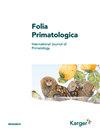Regional variation in the behavioral aspects of long-tailed macaques and its ecological determinants
IF 0.8
4区 生物学
Q2 ZOOLOGY
引用次数: 2
Abstract
Dietary composition and activity budgets of primate are affected by habitat characteristics. We described variations in activity budgets and dietary habits of free-ranging long-tailed macaques (Macaca fascicularis) in various habitats, including anthropogenic habitats, through a web-based survey, and tried to find determinants of the regional variation in the behavioral aspects of macaques. The activity budgets of the macaques were stable across sites regardless of geographic, climatic, and anthropogenic characteristics, but dietary composition varied among habitats; the percentage of fruits and seeds was significantly lower at higher latitudes. The plasticity of frugivory in response to regional variations in the food environment was similar to that of macaques inhabiting temperate regions. In habitats with strong human activity, the percentage of anthropogenic foods in the macaque diet was remarkably higher, and fruits and seeds was lower than that in natural habitats. Our results suggested that macaques showed high dietary adaptability to different habitats.长尾猕猴行为方面的区域差异及其生态决定因素
灵长类动物的饮食组成和活动预算受栖息地特征的影响。我们通过一项基于网络的调查,描述了自由放养的长尾猕猴(束猴)在各种栖息地(包括人类栖息地)的活动预算和饮食习惯的变化,并试图找到猕猴行为方面区域差异的决定因素。无论地理、气候和人为特征如何,猕猴的活动预算在各个地点都是稳定的,但不同栖息地的饮食组成不同;在高纬度地区,果实和种子的比例明显较低。象牙对食物环境区域变化的可塑性与居住在温带地区的猕猴相似。在人类活动强烈的栖息地,猕猴饮食中人为食物的比例显著较高,水果和种子的比例低于自然栖息地。我们的研究结果表明,猕猴对不同的栖息地表现出很高的饮食适应性。
本文章由计算机程序翻译,如有差异,请以英文原文为准。
求助全文
约1分钟内获得全文
求助全文
来源期刊

Folia Primatologica
生物-动物学
CiteScore
3.30
自引率
10.50%
发文量
36
审稿时长
>12 weeks
期刊介绍:
Recognizing that research in human biology must be founded on a comparative knowledge of our closest relatives, this journal is the natural scientist''s ideal means of access to the best of current primate research. ''Folia Primatologica'' covers fields as diverse as molecular biology and social behaviour, and features articles on ecology, conservation, palaeontology, systematics and functional anatomy. In-depth articles and invited reviews are contributed by the world’s leading primatologists. In addition, special issues provide rapid peer-reviewed publication of conference proceedings. ''Folia Primatologica'' is one of the top-rated primatology publications and is acknowledged worldwide as a high-impact core journal for primatologists, zoologists and anthropologists.
 求助内容:
求助内容: 应助结果提醒方式:
应助结果提醒方式:


